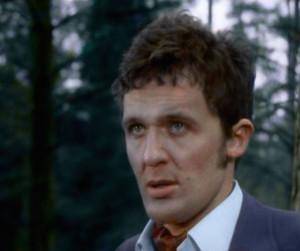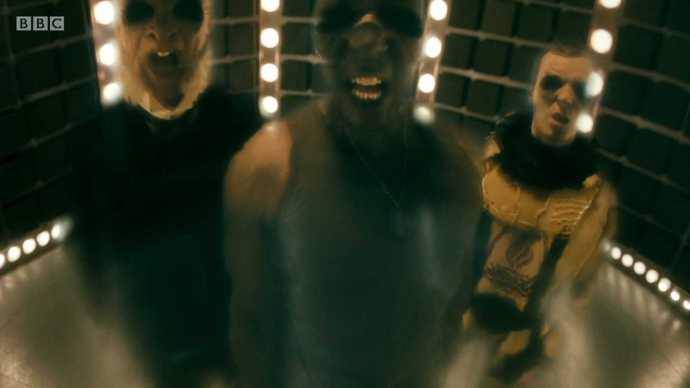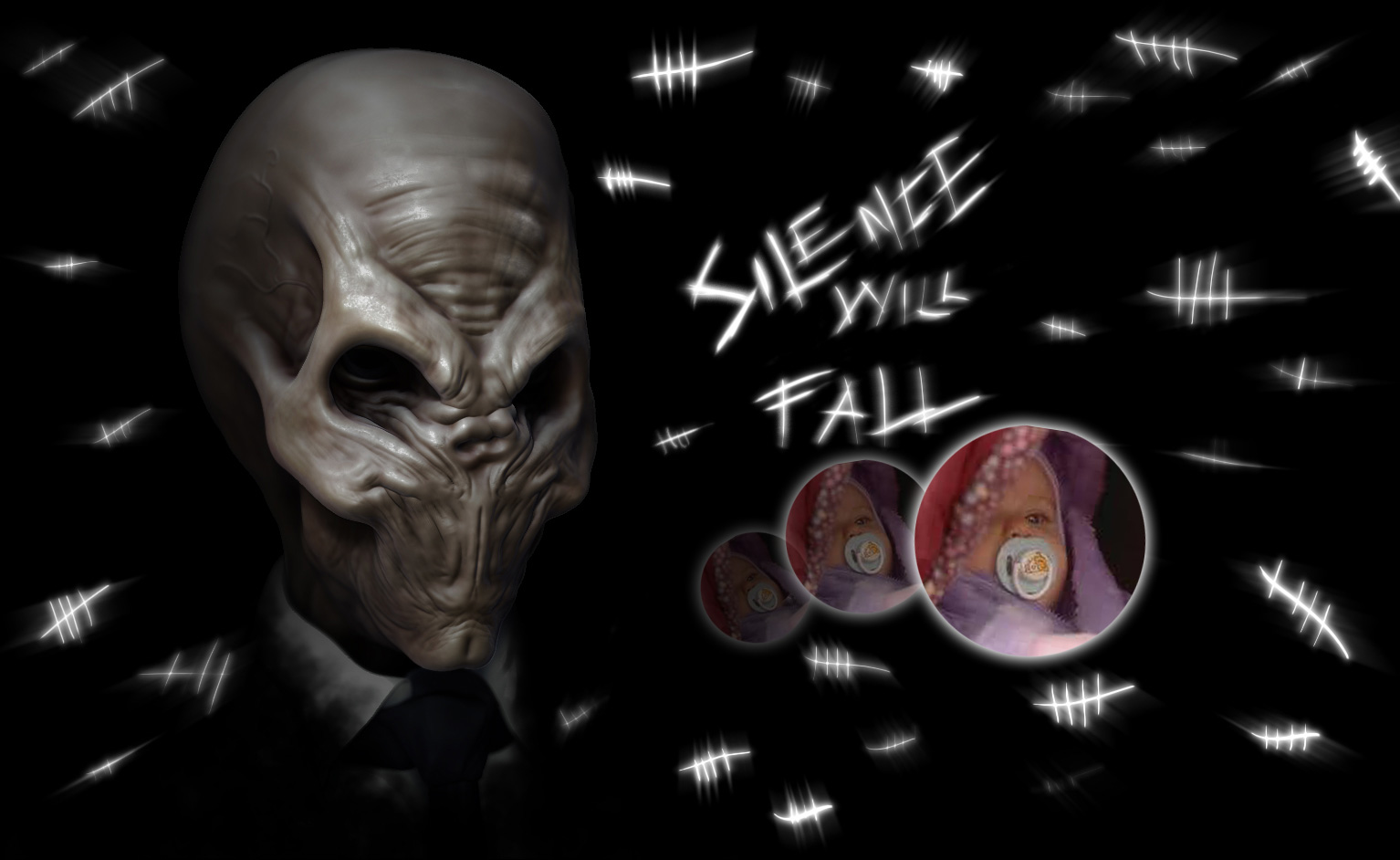In the quiet, evening light, Ginny drifts to the sound of the TARDIS on take-off. Earlier today she was a clerk at a department store, but tonight she will travel with a madman in a box. The television flickers all of time and space into her bedroom, and she imagines herself as Rose Tyler. The sound of the alarm clock that wakens Rose in the streaming episode is a hypnotic trigger that sends Ginny deeper into the vortex of her own timeline.
One moment she is lying on her back, tucked in by comforter and blanket while she watches Rose grab purse and lunch, and toss a good-bye over her shoulder to her Mum. Then, in an instant, she wakes up on the floor of the TARDIS. Staring up into the bright lights of the console tower, she vaguely makes out the shape of the Doctor. She can tell he is agitated by the tone of his mumbling. The only word that Ginny can wholly understand is ‘baby.’ The Doctor stumbles around the console, trips over Ginny and continues muttering about the Silence. She watches, wonders why he’s so obsessed with silence. He stops. Starts. Stops. Looks back over his shoulder.
“Oh, hi. So who are you?” He goes back to pressing buttons and manipulating levers.
Ginny props herself up on one arm, shields her eyes with the free hand, “Rose” she says, “Rose Tyler.”
“Well, a name is fine, but who are you Rose Tyler?”
She shakes her head, tries to orient herself to the inside of the TARDIS: “Just a shop girl. A tired shop girl.”
“Hmmmm, nobody is ‘just.’ I’m the Doctor. I’m not yet sure how you appeared on the floor of my ship, but you’re here now and there’s no turning back. We’re off to rescue an infant! Though I’ve no idea whose infant or why.”
Rose raises herself to a seated position then pulls herself up to standing by grabbing onto the console. Everything looks familiar to her. “I’ve seen you on television,” she says, “haven’t I?”
The Doctor looks amused. “Really? On the telly? I am rather fantastic, aren’t I?”
Rose doesn’t understand, decides that it wouldn’t progress matters to probe the question. “I lost a baby two years ago. Odd,” she says, “her name is Rose too.” She pauses for a moment, “Or, is that a story I know from someone else?” Rose rubs at her temple. Brain freeze, she thinks.
He glances over at her then faces her full on. His eyes scan her from the top of her head down to her toes. He picks up his sonic screwdriver and uses it to scan her a second time. “There are no coincidences Rose. Maybe the baby I’m looking for is yours. Or, you.”
At that moment the TARDIS lands with a lurch. Rose startles and the Doctor strides to the door. “After you Miss Rose Tyler.”
Outside of the TARDIS, daylight jolts Rose from reverie to high alert. In front of her is a house that looks disturbingly familiar. Standing on the lawn is a woman in a skirted business suit holding a cell phone to her ear. She turns and waves at the Doctor, ending her phone call.
“Glad to see you got my message,” said Kate Stewart, of Unified Intelligence Taskforce.
“Of course, UNIT calls and I answer immediately. Your wish is my command, dear Kate.” The Doctor grins. “It’s been too long since I’ve seen you! Now, what’s this important flutter about a baby?”
“Yes, well a baby is missing, but I’m more concerned about who may have taken the baby. The parents cannot seem to remember anything. They have a feeling that something had been watching them for a while, but no concrete information to give us. You understand what I’m thinking, yes?”
“The Silence…” started the Doctor
“Yes,” said Kate while Rose wondered, again, what the hullabaloo over silence could be. “Why, Doctor, would they want this baby?” Kate finished.
“Bad Wolf.” The two words came up from deep in Rose’s throat. Stunned by her own strange outburst, Rose clapped a hand over her mouth. Kate and the Doctor looked at her in surprise. “Wha…” Kate began.
“I scanned Rose when she arrived in the TARDIS. She appeared out of thin air. I’m certain that the baby we’re looking for is Rose,” revealed the Doctor.
“Could someone please explain to me what’s happening?” asked Rose.
“Sure. You’re you. But you may not have been you if Kate and I weren’t here to get you back from the Silence.”
Rose stared over the shoulder of the Doctor to a man and a woman sitting on the porch of the house. They appeared to be consoling each other. She rubbed her temple. Odd, she thought, I’ve an ice-cream headache that won’t go away and I haven’t eaten any ice-cream. She continued to rub her temple and asked “Would they be my parents?”
“If what the Doctor says is accurate, then yes,” said Kate. “The lost baby’s name is Rose. Her parents are inconsolable. Now may not be the best time to spring your adulthood on them. Don’t you think Doctor?”
“I’m not worried about talking to them right now or introducing Rose to them. You’ve got professionals to help them deal with the loss and the ongoing search. Let’s go into the house, Kate. Show me what you’ve discovered.”
“Doctor,” Kate said, “somehow this baby’s abduction has everything to do with you, doesn’t it?”
“Us,” said the Doctor pointing to Rose. “It has everything to do with us.”
Inside, the house was in chaos. UNIT personnel had a makeshift control center set up in the living room. LED light poured from computer screens, phones rang, and a large white board, covered in written bullet points and pictures of a baby, had been hung on one wall. A monitor scrolled through up-to-the-moment pictures of each room of the house. Rose watched the pictures. The kitchen, bathrooms, the basement, bedrooms, and the attic all represented, all apparently fit with security cameras.
“Doctor,” she said, “Can we take a tour of the house?”
The Doctor was in the midst of a conversation with a young man seated at a computer. He used his finger as a pointer and poked it at the screen while talking about cracks in the universe. “Not now, Rose. Why don’t you go into the kitchen and get yourself some coffee.”
“But I want to make myself useful.”
“We’ll tour the house in a short while. You can come along then.” said the Doctor somewhat absent-mindedly.
Rose shrugged and wandered off toward the kitchen. She found coffee and an assortment of baked goods. On the other side of the kitchen island she noticed a narrow stairway beyond an open door, decided she wasn’t hungry and made a beeline for the stairs. Once she was a step up, she turned around and pulled the door shut. She didn’t want anyone trying to stop her. At the top of the stairs Rose found what appeared to be a room used for nothing more than storage. Rose shivered. It was oddly cold in the room. She walked over to a file cabinet and opened the top drawer. While she was rifling through folders, she caught sight of a dark shape out of the corner of her eye. She shivered again, then went back to rifling, forgetting. When she turned from the file cabinet she found herself face-to-face with a tall creature in a black suit. She jumped back and let out a screech. He cocked his head at an angle and told Rose to bring the Doctor to this room. She turned and ran for the stairs then through the kitchen and back into the living room.
As she tumbled in, the Doctor noticed she had gone pale. “All right Rose Tyler?” he asked.
“Yeah, sure, fine,” Rose replied.
“Then why are you stumbling about all out of breath?
“Huh,” Rose said. “I guess…well I guess I don’t know. I feel a bit foggy and unsettled.” She shook her head in an attempt to clear the fog. “I think I need that coffee.”
The Doctor followed her into the kitchen. He wanted to take time to ask her questions about herself and how she ended up on the TARDIS floor when he noticed the stairway that Rose had gone up earlier and walked over to the doorway.
“I’ve been up there. Not much there but some file cabinets,” Rose said.
“Ok,” the Doctor said and walked to the coffee pot, “later.” He poured himself a cup of coffee, placed it on the counter and then looked straight at Rose.
“Why do they want to take you Rose?” Rose shrugged. “Tell me about your parents,” the Doctor said. “Maybe there’s some type of a clue in who they are or what they do.”
“Nawww. My parents?” Rose asked. “They’re just simple folk. Well, my Dad isn’t really all that simple. He invents things. I always thought they were interesting things, but no one else did apparently. He never sold any of his inventions, though he tried.”
“Tried?” asked the Doctor. “Is he gone?”
“Yes, he died in a car accident.” Rose said. “We should go up those stairs, Doctor. You should probably look in those file cabinets.”
“Nahhhhhh,” the Doctor began. “I want to learn more about you.”
“I can answer all your questions while you’re looking through those files!”
“Oh, ok. Let’s go up then,” said the Doctor.
As they walked up the stairs, they heard a baby crying. Rose glanced over at the Doctor. The Doctor seemed to take the sound of the baby in stride.
“Did you hear that?” asked Rose.
“What?” asked the Doctor. “You mean the baby crying. Yeah, of course I heard that. I’m surprised it took so long for me to hear the baby. We are here, after all, because of a missing baby.”
“True,” said Rose. “But we didn’t think the baby would be in this house.”
“You girls from London. Always thinking you know what’s what,” the doctor said through a grin. “I knew the baby would be in the house. We’re here. If the baby were not here in the house, we would not be here.”
At that moment they heard the baby cry again and hurried up the stairs. A Silent met them at the top. The Doctor stared at him hard, keeping his eyes focused. “Where is the baby?” he demanded.
“In exchange for you, Doctor, the baby will be given back,” uttered the Silent.
“Right. No,” said the Doctor and walked beyond the Silent toward the baby’s cry.
Rose followed. The Doctor handed her a black marker. “What’s this for?” she asked.
“Every time you see a tall alien in a dark suit, put a tally mark on you. I want us to keep track of when we see them.” Rose shook her head in confusion. “The Silence erase your memory,” said the Doctor. “You are only aware of them when you look at them. When you look away they are forgotten.”
They found another door on the other side of the room. When they opened it they saw a cradle suspended over a vat. The cradle swung precariously as the baby moved around. It was only a matter of time before the cradle tipped too far and the baby fell out and into the vat below. “Acid,” said the Doctor.
“If that baby falls into the acid, what will happen to me?” asked Rose.
“You’ll cease to exist. Poof. You’ll disappear, timeline erased,” said the Doctor.
“How comforting,” said Rose. “Let’s get that baby down!” She turned and yelped. A group of Silents had entered the room. Marker ready, she wrote down the tally on her arm.
The Doctor had climbed on a chair and was busy examining the rope structure suspending the cradle. He did not look back, but called to Rose, “Don’t take your eyes off them!” At that moment, UNIT personnel burst into the room: Silents scattered, Rose screamed, and the Doctor took a spill from the chair he’d been standing on. His sonic screwdriver rolled away and across the floor. A passing Silent picked it up, then strode from the room.
Kate followed the UNIT personnel. “We hear the baby crying. That baby could not have been in this house the entire time we’ve been here!” she exclaimed. “And why was this room not fit with a security camera!”
“You’re right, the baby was not here the entire time. I would imagine that the Silence brought her here once I arrived. Rose, look at your arm. How many tally marks are there?” The Doctor asked while crawling around on the floor.
“Ten,” Rose gasped. “What are you doing crawling around on the floor?”
“Looking for my sonic screwdriver, I dropped it when I fell. Kate, the Silence is here now. We need to keep an eye on the cradle so it’s not taken while we look away.”
At that moment, a UNIT member shouted, “A rope’s been cut, the cradle is going to tip over!” No one remembered seeing the rope cut, but out of the corner of her eye, Rose had seen a Silent and marked it on her arm.
“Eleven tally marks,” she said to the Doctor.
A UNIT member appeared with a ladder, the cradle tipped further, so far to the side that everyone could see the baby now. The Doctor scrambled to get the ladder set up, but as he began to climb he saw a Silent reach for the baby, pull it from the cradle before the Doctor could, and hold it high above the vat. “Don’t stop looking,” the Doctor called out. “Don’t…stop!”
UNIT members rushed the Silent, their eyes trained on him. The Silent’s grip released on the baby and she flew up into the air and tumbled down toward the roiling vat of acid. The Doctor grabbed a round table top, grinning and whooping “you gotta love storage rooms” and placed it over the vat. He reached over the table top and grabbed the baby’s sleeper with one hand, while the other hand flew up and under her armpit.
“Got her!” he cheered, drawing her close to his body and shielding her. UNIT members surrounded him to aid in protection.
“Silence will fall,” they heard a guttural voice proclaim.
The Doctor’s sonic screwdriver rolled across the floor and stopped at his feet. “Thanks for that,” he said as he bent to pick it up.
“Thirteen tally marks!” called Rose.
“And no more tonight,” said the Doctor. “Let’s get baby Rose back to her parents.”
“She is me,” Rose said with wonder. “I have seen pictures of me in this sleeper. Can I hold her?”
“Unfortunately not. The paradox would bring harm to both of you,” said the Doctor as he carried baby Rose downstairs.
Rose’s parents were standing in the kitchen. They had been alerted that the baby was in the house and would be retrieved soon. When the Doctor walked through the doorway holding the baby, their tears began to flow.
“How can we ever thank all of you?” they gushed.
“You already have,” said the Doctor. “Baby Rose is special. She will grow up to travel to distant places and do great things in this wibbly-wobbly universe,” he said with a wink to Rose. “Your daughter will scatter her words throughout time and space.” Rose’s parents stared at him blankly, then returned to hugging the infant. The Doctor said his good-byes to Kate and other UNIT members and began to make his way out of the house to the TARDIS.
“C’mon,” he waved to Rose, “It’s time to get you back home.” Rose was fixated on her parents. She wanted to say something to acknowledge her Mum and Dad, but words would not come. She took a step closer and reached a hand out toward her Mum, but her parents were locked in their group hug, baby Rose smashed between the two of them. Rose decided it best not to interrupt. She turned and followed the Doctor, wiping a tear from her eye.
“Home,” Rose whispered as she stepped inside the TARDIS. She looked around and knew that she felt oddly at rest in this traveling ship that was bigger on the inside. “I don’t want to go home.”
“For tonight, Rose. You’ll be back in the TARDIS again. I’ll take you to distant stars, beautiful and tragic planets. You’re going to have a good year, Rose Tyler, a very good year.”
The sleepy Ginny vaguely heard the credits of the episode she had been watching. She rolled over on her side, stretched long like a cat, and peered cautiously out of half-closed eyes. On the hardwood floor next to the bed she noticed a pile of what looked like soot or ash. What on earth is that, she wondered. Wait, she thought, that looks like the ash left from the dream crabs in “The Last Christmas.” She sat up in bed, rubbing her eyes. The last of the credits were rolling off the screen. Ginny remembered seeing the Doctor. Slowly the dream images began to come back.
“Wow,” she said out loud. “That was wild. I was Rose Tyler. I was the Doctor’s companion, how timey-wimey and wibbly-wobbly. And dream crabs are real.”
She turned off the television, settled back beneath her blanket and comforter and smiled. Bad Wolf, she said softly to herself. As she drifted off for the night, she heard the sound of the TARDIS on take-off.
The End




